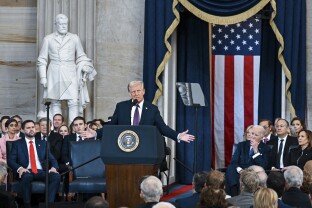Seventeen Democratic members of Congress are demanding the president’s inaugural committee formally explain financial “inconsistencies” and “discrepancies” detailed in a recent article by NOTUS.
The letter to the Trump Vance Inaugural Committee, dated Sept. 10, is signed by several of President Donald Trump’s leading antagonists including Reps. Jamie Raskin, a former Trump impeachment manager; Bennie Thompson, former chairman of the Select Committee to Investigate the January 6th Attack on the U.S. Capitol; Pramila Jayapal; Jerrold Nadler; and Mary Gay Scanlon.
NOTUS in July reported that Amazon, General Motors and Microsoft told Congress they contributed significantly more money to Trump’s 2025 inaugural committee than the inaugural committee itself publicly reported to the Federal Election Commission.
Similarly, insurer USAA correctly reported to Congress that it donated $100,000 to the Trump inaugural committee from its corporate treasury, while the Trump committee erroneously told FEC regulators that it received $100,000 from USAA’s political action committee.
Following NOTUS’ report, the Trump inaugural committee, which raised nearly $250 million overall to more than double Trump’s 2017 inaugural record of $107 million, amended its financial disclosure to fix the errors.
“We appreciate that the Committee has since filed amended contribution reports resolving the discrepancies related to General Motors, USAA, Amazon, and Microsoft,” the lawmakers’ letter states. “Nonetheless, the initial underreporting and subsequent delayed revisions raise ongoing concerns.”
In the letter, obtained exclusively by NOTUS, the lawmakers set a Sept. 26 deadline for the Trump inaugural committee to answer three questions to help address “the need for greater transparency and oversight in inaugural fundraising”:
- “Why did it take the Committee multiple months and successive amendments to correct their inaccurate filings?”
- “What internal procedures and controls does the Committee have in place to ensure accurate and complete reporting of both cash and in-kind contributions to the FEC?”
- “Has the Committee communicated with the FEC regarding these discrepancies, or been contacted by the agency concerning possible violations of campaign finance law?”
Other letter signatories include Reps. Joseph Morelle, Summer Lee, Jasmine Crockett, Lateefah Simon, Delia Ramirez, Betty McCollum, Chuy García, John Garamendi, Deborah Ross, Shri Thanedar and Becca Balint, as well as Del. Eleanor Holmes Norton of Washington, D.C.
“President Trump had a landslide victory, unifying inauguration, and historic fundraising — Democrats should not be hostile towards the president’s incredible success on behalf of American people,” Trump inaugural committee spokesperson Danielle Alvarez told NOTUS. “Instead of wasting everyone’s time, they should get to work alongside President Trump to secure our border, restore our economy, combat crime, and deliver for our great nation.”
President Joe Biden’s 2021 inaugural committee, as well as President Barack Obama’s 2009 and 2013 inaugural committees, also amended their original reports with additional financial information, such as donation refunds adjustments to unitemized donation totals.
In January, Scanlon, the letter’s lead author, reintroduced the Inaugural Fund Integrity Act, which in part would mandate rapid disclosure of inaugural committee contributions and cap them at $50,000 — they’re presently unlimited and may come directly from corporate, union and nonprofit benefactors.
The bill would also require presidential inaugural committees to publicly disclose how they spend their money, which is not currently a requirement, in addition to disclosing their funding sources.
“This extraordinary fundraising total, with at least 140 individuals or companies giving $1 million or more, underscores the risk of influence peddling and preferential access through inaugural committees,” the Democratic lawmakers’ letter states. “These committees operate under far less stringent transparency rules than political campaigns, and inaugural donations may be used for a wide variety of activities with limited oversight.”
Sign in
Log into your free account with your email. Don’t have one?
Check your email for a one-time code.
We sent a 4-digit code to . Enter the pin to confirm your account.
New code will be available in 1:00
Let’s try this again.
We encountered an error with the passcode sent to . Please reenter your email.


